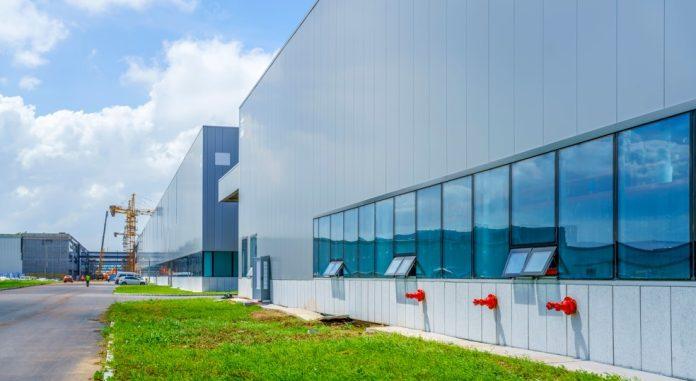In the ever-evolving landscape of logistics, one technological advancement is garnering considerable attention and changing the way businesses manage their inventory and supply chains: Prefab Warehouses. With the global market’s increasing demand for quicker deliveries and more streamlined storage solutions, these innovative structures are making a significant impact. In this article, we’ll delve into the world of prefab warehouses, exploring their benefits, applications, and how they are revolutionizing the field of logistics.
The Rise of Prefab Warehouses
Prefab warehouses, short for prefabricated warehouses, have rapidly gained traction in recent years as an ingenious solution to the challenges posed by traditional storage facilities. These warehouses are constructed off-site in controlled environments before being assembled at their designated locations.
This construction approach allows for faster deployment and reduces the downtime typically associated with conventional warehouse construction. As a result, businesses can have functional storage spaces in a fraction of the time it would take to build a traditional warehouse.
Benefits of Prefab Warehouses
Speedy Construction
Traditional warehouse construction is a time-consuming process that often stretches over several months or even years, causing delays in operational readiness. In stark contrast, prefab warehouses offer an impressive advantage with their remarkable ability to be fully functional within a mere matter of weeks.
This accelerated construction timeline empowers businesses to be agile in their responses to ever-changing market demands, ensuring that they can promptly adapt to trends, fluctuations, and customer preferences, ultimately fostering increased customer satisfaction and competitive edge.
Cost-Efficiency
Prefab warehouses present a notable cost-efficiency advantage when compared to conventional alternatives. This stems from their streamlined construction procedures, diminished labor needs, and optimized material usage, all of which collectively contribute to diminished overall expenses.
Moreover, these warehouses incorporate energy-efficient design principles, resulting in long-term operational cost savings. By embracing prefab warehouses, businesses can achieve not only immediate financial benefits but also ongoing sustainability in terms of reduced operational overheads, bolstering their bottom line in the process.
Flexibility and Scalability
Prefab warehouses are the epitome of versatility, intentionally constructed to meet changing needs. Businesses can easily expand their storage capacity by seamlessly integrating modular portions into the current framework.
This intrinsic scalability allows for the synchronized development of storage solutions in tandem with the rise of operating demands, all without the necessity for significant investments in new construction projects.
It also optimizes resource allocation while also ensuring that firms can respond quickly to changing market conditions while retaining operational efficiency and cost-effectiveness.
Quality Control
Prefab warehouses, because they are built in controlled surroundings, reduce the impact of external influences, most notably adverse weather, on the construction process. The end result of this technique is the construction of unwavering structural integrity, which ensures the safety of stored goods and workers.
Through minimizing the uncertainties associated with weather-related construction delays, these warehouses maintain consistent quality, ensuring the preservation of commodities, worker safety, and overall operational consistency.
Environmental Sustainability
A notable feature of many prefabricated warehouses is the incorporation of sustainable construction approaches and eco-friendly materials. This conscious approach aligns with the growing emphasis on corporate social responsibility and the need for environmental stewardship.
By embracing sustainable techniques, these warehouses not only help to reduce environmental effects but also appeal to environmentally aware customers. This integration of operational methods and ethical considerations helps to strengthen a company’s reputation and market position.
Applications Across Industries
Prefab warehouses have found applications across a diverse range of industries, including:
E-commerce and Retail
The explosive expansion of online shopping has underscored the urgency for efficient storage solutions. Prefab warehouses prove instrumental for e-commerce enterprises, optimizing inventory storage and management. This, in turn, expedites order fulfillment processes and drastically curtails delivery timelines, meeting the heightened expectations of modern consumers for swift, hassle-free transactions.
Manufacturing
Effective storage solutions are a cornerstone for manufacturers, accommodating raw materials, works-in-progress, and final products. Prefab warehouses play a crucial role in this aspect, providing the essential flexibility required to expertly manage this range of storage requirements. This adaptability seamlessly streamlines operations, empowering manufacturers to navigate intricate supply chains and intricate production processes with enhanced efficiency.
Automotive
Rapid access to parts and components is critical in the automotive industry. Prefabricated warehouses act as a cornerstone, enhancing supply chain management to ensure continuous production processes. These warehouses improve the industry’s operational continuity and efficiency by allowing for the prompt retrieval of vital materials.
Agriculture and Food Storage
The agriculture and food industries have a wide range of storage needs, from perishable commodities to bulk produce. Prefab warehouses meet these criteria perfectly, providing temperature-controlled conditions that are exactly adapted to their specific needs. This specific technique ensures that quality, safety, and freshness are maintained throughout the supply chain.
Key Takeaway
In the fast-paced world of logistics, efficiency is the cornerstone of success. Prefab warehouses are transforming the storage landscape by offering speed, cost-effectiveness, flexibility, and sustainability. Their applications span industries, enabling businesses to meet consumer demands effectively and streamline their supply chains.
As businesses continue to explore innovative solutions, prefab warehouses stand out as a revolutionary answer to the storage challenges of the modern era. Embracing these structures can position businesses at the forefront of logistics excellence, propelling them into a more efficient and competitive future.
